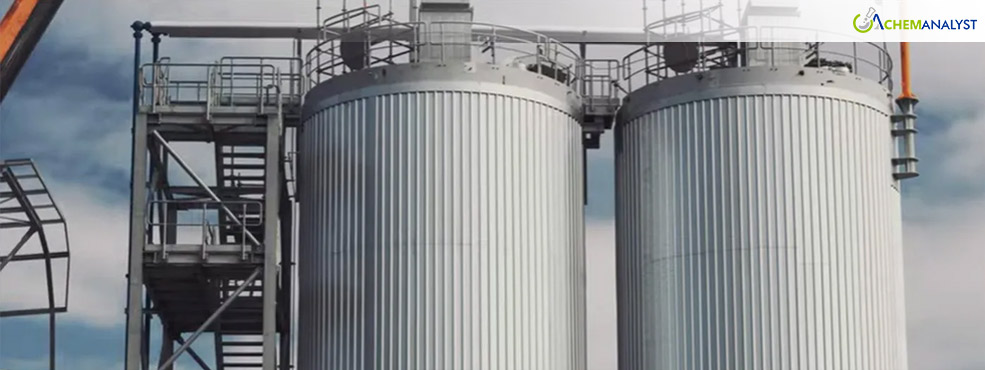Welcome To ChemAnalyst

The UK government has unveiled a commitment of up to £21.7 billion to facilitate the launch of the nation's inaugural carbon capture and storage projects. This initiative represents a pivotal moment for the burgeoning industry, while also drawing attention to the substantial financial investments required.
Ministers have stated that this funding, allocated over a period of 25 years, will facilitate the development of two undersea carbon storage sites and associated pipelines, collectively capable of storing more than 8.5 million tons of carbon dioxide annually. Additionally, it will support carbon capture initiatives at three proposed projects aimed at producing hydrogen, electricity, and energy from waste. These projects are located in Teesside and Merseyside in northern England.
According to provisional government figures, the UK emitted 384.2 million tons of carbon dioxide equivalent in 2023. Nevertheless, this initiative represents a significant first step toward establishing the carbon capture and storage industry in the UK and reflects an effort to instill confidence in the government's commitment to the sector.
However, the three industrial sites selected to receive funding for the implementation of carbon capture technology represent a significant reduction from the eight sites that engaged in negotiations with the government last year. The prospects for support for the remaining sites are now uncertain.
Additionally, the government did not provide specific details regarding assistance for the subsequent group of capture and storage projects identified by the previous administration for future funding, which are located in Scotland and the Humber region.
A spokesperson for the Labour Party reiterated the party's firm commitment to the industry in "Humberside, Scotland, and several other regions across the country," asserting that "this represents our initial step, and we will articulate our forthcoming strategies in due course."
The government has conveyed that its financial support, which may reach up to £21.7 billion, will be derived from a combination of levies on energy bills and allocations from the Treasury. This funding is expected to attract approximately £8 billion in private investment for the proposed projects.
Moreover, the government is keen to underscore its capacity to secure private financial investment for the UK as it prepares for the upcoming international investment summit set for October 14.
Prime Minister Sir Keir Starmer stated that the government is “reinvigorating our industrial heartlands” and that this support will “provide the industry with the certainty it requires.”
Carbon capture and storage (CCS) entails capturing carbon dioxide as it is generated, compressing it, and then injecting it underground, often into depleted oil and gas reservoirs, to prevent its release into the atmosphere.
This technology is regarded as essential to the UK's legally mandated objective of achieving net zero carbon emissions by 2050. However, uncertainties remain regarding its commercial viability and technical feasibility on a large scale.
Global carbon capture capacity reached approximately 51 million tons last year, accounting for 0.14 percent of total global emissions, including initiatives in the United States, Canada, and Norway.
Prior government efforts to bolster the industry in 2011 and 2015 were abandoned at the last minute.
In 2023, Jeremy Hunt, then Chancellor of the Exchequer, pledged £20 billion for investment in carbon capture and storage projects over a 20-year period; however, none of this funding was accessible prior to this year's general election.
The carbon storage projects slated to receive support include the initiative by Italian oil giant Eni in Liverpool Bay, located in the northwest, and the Northern Endurance Partnership off the coast of Teesside in the northeast, which is being developed collaboratively by BP, Equinor, and Total Energies.
Among the power projects set to benefit from this support is the Net Zero Teesside gas-fired power station, a joint venture between BP and Equinor. Tees Valley Mayor Lord Ben Houchen announced that construction is expected to commence by the end of this year, potentially generating 4,000 jobs in the construction sector.
Additionally, the Protos energy-from-waste facility being developed by Encyclis and Biffa in Cheshire, as well as a hydrogen production plant being established by Essar at its Stanlow oil refinery, are the other two industrial sites that have secured support for capturing their emissions.
Certain scientists and environmental advocates contend that the industry is leveraging carbon capture and storage (CCS) to extend the operational lifespan of fossil fuel assets. In contrast, organizations such as the Climate Change Committee, which advises the government, argue that CCS is essential for the UK to achieve its climate objectives.
We use cookies to deliver the best possible experience on our website. To learn more, visit our Privacy Policy. By continuing to use this site or by closing this box, you consent to our use of cookies. More info.
